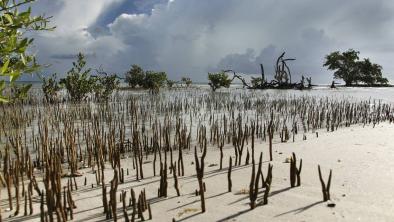Science Source
Economic losses from US hurricanes consistent with an influence from climate change
- States the frequency and intensity of extreme weather events has changed, but the observed increases in natural disaster losses are often thought to result solely from societal change, such as increases in exposure and vulnerability
- Analyzes the economic losses from tropical cyclones in the United States, using a regression-based approach instead of a standard normalization procedure to changes in exposure and vulnerability, to minimize the chance of introducing a spurious trend
- Uses statistical models to estimate the contributions of socioeconomic factors to the observed trend in losses and we account for non-normal and nonlinear characteristics of loss data
- Identifies an upward trend in economic losses between 1900 and 2005 that cannot be explained by commonly used socioeconomic variables
- Identifies an upward trend in both the number and intensity of hurricanes in the North Atlantic basin as well as in the number of loss-generating tropical cyclone records in the United States that is consistent with the smoothed global average rise in surface air temperature.
- Estimates that, in 2005, US$2 to US$14 billion of the recorded annual losses could be attributable to climate change, 2 to 12% of that year’s normalized losses
- Suggests that damages from tropical cyclones cannot be dismissed when evaluating the current and future costs of climate change and the expected benefits of mitigation and adaptation strategies
Related Content
Science Source
| Geophysical Research Letters
Increasing Magnitude of Hurricane Rapid Intensification in the Central and Eastern Tropical Atlantic
Karthik Balaguru, Gregory R. Foltz, L. Ruby Leung
Headline

Apr 19, 2018 | Miami Herald
NASA team finds massive Everglades mangrove damage from Irma. Can it recover?
Headline

Mar 22, 2018 | Reuters
Last three years hottest on record, severe weather hits 2018: U.N.
Headline

Jan 23, 2018 | Nature
Atlantic hurricanes' rapid growth spurts are intensifying


